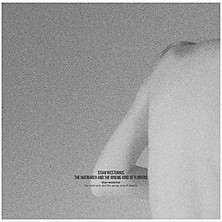Earlier this month, Stian Westerhus took to the stage in London’s Cafe Oto to give a performance that was as exhausting as it was utterly exhilarating. Opening with a volatile collision of growling rhythmic figures smeared with searing melodies, Westerhus proceeded to conjure a huge variety of textures. Using a single semi-acoustic guitar and a chain of stomp boxes, Westerhus seemed to grapple physically with the music: the fragmentary shards of guitar noise charging his body with electric energy. Throughout the entire set, music and movement were conjoined in a heady, swirling fusion; the stuttering rhythms of both body and sound were locked together as his ungainly figure traced angular lines through space. Not only did this culminate in a fiercely visceral experience for the audience, but Westerhus’ highly gestural performance style served to delineate the music, his awkward contortions lending it definite structure.
The music being performed that evening was from the Norweigian guitarist’s latest album The Matriarch And The Wrong Kind Of Flowers, recorded at the Emanuel Vigeland Mausoleum in Oslo earlier this year. Away from Westerhus’ intensely physical live performance, this recording is predictably stripped of a certain amount of dramatic potency. Of course, this has always been a problem inherent in the recording of live sound, which moves it away from the realms of the body and into the abstract. Yet Westerhus’ performances seem to rely so heavily on the spontaneity of the event that his music undergoes a striking transformation when translated into the solely aural domain. Stripped of his presence, the music becomes far more vague and indistinct.
Yet, while hearing this music on record certainly constitutes a vastly different experience from that of witnessing it in a live setting, it’s not so straightforward to evaluate this shift. On record, Westerhus’ music is instilled with an intoxicating, otherworldly mystique. The Matriarch And The Wrong Kind Of Flowers is situated in an imposing, cavernous space. This reverb turns the music into a constantly shifting cloud, and imbues it with seductive ambiguity. This music is at once distant and captivating, gracefully poised yet generously sensual.
Employing a cello bow prominently throughout the record, Westerhus allows his music to rise furtively from the surrounding space. While the localised effect is that of formlessness, Westerhus’ refined sense of dynamic and textural shaping keeps his ambient soundscapes from regressing into insipid homogeneity: this music is nebulous yet distinctly contoured. Westerhus exploits the unique acoustic properties of the mausoleum to create a faintly surreal atmosphere; throughout the record, the grainy texture of the cello bow being drawn across guitar strings becomes subsumed in its own accumulating echo, cloaked in a metallic shiver. This play of perspectives, the blurring of near and far, creates a perpetually shifting, elusive sound-world in which intimate gestures are magnified and then dispersed.
Westerhus’ approach here is not dissimilar to that taken by Tim Hecker last year on Ravedeath, 1972. On these works, both artists have taken an organic sound source (in Tim Hecker’s case it was a church organ) as a starting point, subjecting it to a variety of electronic manipulations whilst foregrounding the characteristics of the acoustic space in which it is situated. With The Matriarch And The Wrong Kind Of Flowers, Westerhus questions whether music can ever exist in a separate realm, abstracted from the act of performance; indeed, the vast space of the mausoleum is written into the sounds themselves, binding the music to its place of origin. While certainly lacking in the visceral energy of Westerhus’ stunning performance at Cafe Oto, this album sets up a fascinating, intricate dialogue between site and sound, commenting on the materiality of live performance while simultaneously transcending it.


